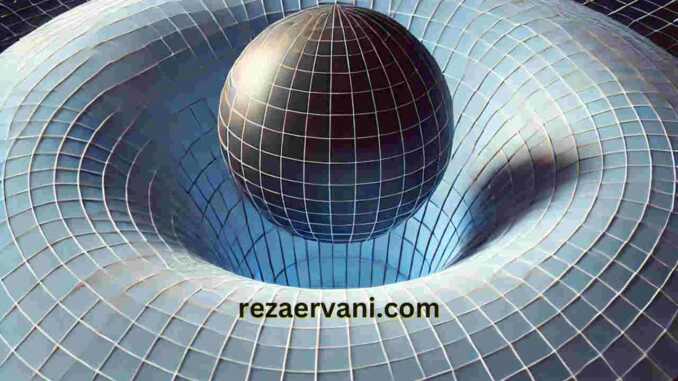
Illustrating the Physical Interpretation of a Verse from the Quran
Study Notes by: Reza Ervani bin Asmanu
This article, Illustrating the Physical Interpretation of a Verse from the Quran, is categorized under “My Thoughts.”
u
The miracle of the Quran transcends time because it touches and invites the intellect to reflect.
You cannot accuse the Quran of being outdated simply because your own thinking has grown obsolete.
Here, I will provide a simple interpretation within the framework of physics, using the excerpt of a verse:
خَالِدِينَ فِيهَا أَبَدًا
Part One: خَالِدِينَ فِيهَا
It is mentioned in Maqaayis al-Lughah:
(خَلَدَ) الْخَاءُ وَاللَّامُ وَالدَّالُ أَصْلٌ وَاحِدٌ يَدُلُّ عَلَى الثَّبَاتِ وَالْمُلَازَمَةِ، فَيُقَالُ: خَلَدَ: أَقَامَ، وَأَخْلَدَ أَيْضًا. وَمِنْهُ جَنَّةُ الْخُلْدِ.
(خَلَدَ) The letters khaa, laam, and daal form a single root word that indicates permanence and attachment. It is said: khalada means “to stay permanently,” and akhlaada also means the same. From this root comes the phrase Jannatul Khuld (the eternal paradise).
— End of Quote from Maqaayis al-Lughah —
From this definition, a physicist reflecting on the verse might interpret it as describing the presence of “space” and “something occupying that space” (from a physics perspective, objects occupying space are depicted as mass and energy).
Part Two: أَبَدًا
It is also mentioned in Maqaayis al-Lughah:
(أَبَدَ) الْهَمْزَةُ وَالْبَاءُ وَالدَّالُ يَدُلُّ بِنَاؤُهَا عَلَى طُولِ الْمُدَّةِ، وَعَلَى التَّوَحُّشِ. قَالُوا: الْأَبَدُ: الدَّهْرُ، وَجَمْعُهُ آبَادٌ. وَالْعَرَبُ تَقُولُ: أَبَدٌ أَبِيدٌ، كَمَا يَقُولُونَ دَهْرٌ دَهِيرٌ.
(أَبَدَ) The letters hamzah, ba, and daal indicate a root meaning of an extended period of time, and can also imply wildness or savagery. It is said that al-abad means an infinite duration, and its plural is aabaad (آباد). The Arabs say: abadun abiidun (an endless duration), just as they say dahr dahir (a long time).
— End of Quote from Maqaayis al-Lughah —
From this definition, a physicist reflecting on the verse might interpret it as describing the concept of “time” (and the notion of infinity).
Three Components in Physics: Space, Time, Mass, and Energy
These three components—space, time, and mass/energy—are central topics in physics.
If I had presented this interpretation during the era of classical physics, I could have claimed that the Quran had already spoken about space, time, mass, and energy long before Isaac Newton’s Philosophiæ Naturalis Principia Mathematica (published in 1687).
When classical physics failed to explain many phenomena, what became outdated? Was it the physicist’s interpretation of the verse or the Quran as the “trigger” for reflection?
It turns out that modern physics, which emerged later, continues to explore the mysteries of space, time, mass, and energy. Some relevant theories include:
- General Relativity (Einstein)
- Special Relativity (Einstein)
- Schwarzschild Metric
- String Theory
So far, the physicist’s interpretation of this verse remains relevant.
But if, in the future, physics discovers new components in its formulas, what becomes outdated? Is it the physicist’s interpretation, or is it the Quran as the source of inspiration?
The Quran: A Source of Inspiration
The Quran can serve as a source of inspiration for anyone, but the inspiration derived cannot be claimed to fully and definitively represent the Quran’s true meaning.
This is because inspiration is ultimately a product of the human intellect—a remarkable gift from Allah. Being a product of the human mind, inspiration can be right or wrong.
When an inspiration is mistaken, you cannot accuse its source of being flawed. Conversely, if an inspiration is (relatively) correct, it represents only a small fraction of the goodness provided by its source, namely the Noble Quran.
Ar Raasikhuna fil ‘Ilmi (Those Firmly Grounded in Knowledge)
The Quran emphasizes the character of those “firmly grounded in knowledge” (Ar Raasikhuna fil ‘Ilmi):
وَالرَّاسِخُونَ فِي الْعِلْمِ يَقُولُونَ آمَنَّا بِهِ كُلٌّ مِّنْ عِندِ رَبِّنَا ۗ وَمَا يَذَّكَّرُ إِلَّا أُولُو الْأَلْبَابِ
And those firmly rooted in knowledge say, “We believe in it; all of it is from our Lord.” And none will take heed except those of understanding. (Surah Ali Imran, verse 7)
Allahu Ta’ala A’lam
Allahummarhamnaa bil Quran
Cileungsi, 15 Rajab 1446 H / 15 January 2025 CE
Leave a Reply